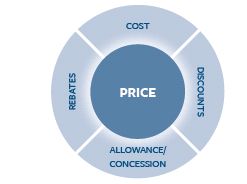Cardinal Sin No. 1 – Price Fixing
Last week we gave you an overview of the four Cardinal Sins under the Competition Ordinance. This week we discuss Cardinal Sin No.1 – price fixing.
Price fixing is one of the worst violations of competition law that will attract the most serious fines. While price fixing may sound straightforward and intuitive, in practice, the legal concept of price fixing captures a wide array of conduct, some of which you may find yourself inadvertently engaging in.
In this article we examine the elements of price fixing and use examples to illustrate how you may avoid entering into a price fixing agreement.
Price Fixing
Price fixing refers to an agreement between competitors to fix, maintain, increase or otherwise control prices.
WHY FIX PRICES?
Price fixing inflates prices and therefore profits by preventing competitors from undercutting each other on price.
WHAT IS AN AGREEMENT?
A mere "meeting of minds" suffices to bring anti-competitive conduct within the scope of the First Conduct Rule. Anti-competitive agreements do not have to be, and indeed, are most often not, set in stone.
To illustrate, an agreement may arise from any form of understanding, including:

What is price?
The concept of price in a competition law context encompasses all components of price. This may include any discount, rebate, allowance, price concession or other advantage in relation to the supply of goods or services:

An agreement to fix any of the above components could constitute price fixing.
How are prices fixed?
As mentioned above the concept of price fixing includes any form of controlling prices, such as maintaining or increasing prices. Below are some examples of conduct that can amount to "fixing":
- Agreeing to a fee schedule.
- Capping the level of discount.
- Publishing "recommended" fee schedules which competitors then follow.
Next Week
Next week we will take a look at Cardinal Sin No.2 – output limitation.
Visit us at www.mayerbrown.com
Mayer Brown is a global legal services organization comprising legal practices that are separate entities (the Mayer Brown Practices). The Mayer Brown Practices are: Mayer Brown LLP, a limited liability partnership established in the United States; Mayer Brown International LLP, a limited liability partnership incorporated in England and Wales; Mayer Brown JSM, a Hong Kong partnership, and its associated entities in Asia; and Tauil & Chequer Advogados, a Brazilian law partnership with which Mayer Brown is associated. "Mayer Brown" and the Mayer Brown logo are the trademarks of the Mayer Brown Practices in their respective jurisdictions.
© Copyright 2015. The Mayer Brown Practices. All rights reserved.
This article provides information and comments on legal issues and developments of interest. The foregoing is not a comprehensive treatment of the subject matter covered and is not intended to provide legal advice. Readers should seek specific legal advice before taking any action with respect to the matters discussed herein. Please also read the JSM legal publications Disclaimer.

